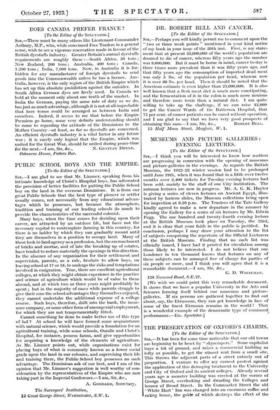PUBLIC SCHOOL BOYS AND THE EMPIRE.
[To the Editor of the SPECTATOR.]
SIR, I am glad to see that Mr. Limmer, speaking from his intimate knowledge of Christ's Hospital boys, has advocated the provision of better facilities for putting the Public School boy on the land in the overseas Dominions. It is from our great Public Schools that the best type of pioneer or settler usually comes, not necessarily from any educational advan- tages which he possesses, but because the atmosphere, tradition and training of our leading schools do much to provide the characteristics of the successful colonist.
Many boys, when the time comes for deciding upon their career, are attracted by an outdoor life, but have not the necessary capital to contemplate farming in this country, for there is no ladder by which they can gradually mount until they are themselves in a position to occupy land. Many of those look to land agency as a profession, but the encroachment of bricks and mortar, and of late the breaking up of estates, have tended to reduce materially the openings in this direction. In the absence of any organization for their settlement and supervision, parents, as a rule, hesitate to allow boys, on leaving school at 17 or 18, to undergo the risks and temptations
involved in emigration. True, there are excellent agricultural colleges, at which they might obtain experience in the practice and science of agriculture which would be of value to them abroad, and at which two or three years might profitably be spent ; but in the majority of cases while parents struggle to give their sons the school advantages they themselves enjoyed, they cannot undertake the additional expense of a college course. Such boys, therefore, drift into the bank, the insur- ance company, or some other form of uncongenial employment, for which they are not temperamentally fitted.
Cannot something be done to make better use of this type of lad ? At school lie will have formed some acquaintance with natural science, which would provide a foundation for an agricultural training, while some schools, Oundle and Christ's Hospital, for instance, possess farms, and give opportunities for acquiring a knowledge of the elements of agriculture. As Mr. Limmer points out, while organizations exist for placing boys of what is commonly known as a lower social grade upon the land in our colonies, and supervising their life and training there, the Public School boy possesses no such advantage. The Dominions ask of our best, and I am of the opinion that Mr. Limner's suggestion is well worthy of con- sideration by the representatives of the Empire who arc now taking part in the Imperial Conference.—I am, Sir, &c.,
A. GODDARD, Secretary.
The Surveyors' Institution, 12 Great George Street, Westminster, S.W. I.














































 Previous page
Previous page